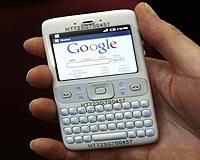 |
Washington (AFP) March 1, 2010 The more time teens spend watching television or playing on a computer or games console, the less likely they are to be close to their family and friends, a study published Monday shows. And with technology providing us with screens to do everything from entertaining ourselves to educating ourselves, the findings give cause for concern, the authors of the study wrote in the Archives of Pediatric and Adcolescent Medicine. The study looked at two groups of teens in New Zealand, 16 years apart. The first group, made up of 976 teens, spent a day at a research unit around about the time they turned 15, in 1987 or 1988, to assess the amount of time they spent watching television on a school day, and their attachment to parents and peers. The second group was made up of more than 3,000 youngsters who turned 14 or 15 in 2004, when there were more screen opportunities available to youngsters than just watching television -- but not as many as today. That group completed questionnaires at their schools to find out how long they spent watching TV, DVDs or videos; how long they spent using a computer for anything other than doing homework; and how long they spent playing games on their computer or on a console such as XBox, Playstation or Nintendo. The second group was also asked how long they spent reading or doing homework. How close they were to friends and family was assessed using the same questionnaire as for the other group, 16 years earlier. In the first, television-only group, the researchers found that for every extra hour spent watching TV, "there was a 13 percent increase in the risk of having low attachment to parents and a 24 percent increase in the risk of having low attachment to peers." The findings were similar for the second group but only in terms of how close they were to their parents. For every extra hour spent watching television or playing on a computer or games console, the teens were around five percent more likely to be less close to their parents. Teens who spent more time reading and doing homework, meanwhile, were found to be closer to their parents. A teens in the second group who spent more time playing on a computer or games console were found to be less attached to their peers. "Given the importance of attachment to parents and peers for adolescent health and development, concern about high levels of screen time among adolescents is warranted," the researchers wrote. "With the rapid advance of screen-based options for entertainment, communication and education, ongoing research is needed to monitor the effect that these technologies have on social development and psychological and physical well-being among adolescents," they said.
Share This Article With Planet Earth
Related Links Space Technology News - Applications and Research
 Smartphones under growing threat from hackers
Smartphones under growing threat from hackersBarcelona, Spain (AFP) Feb 17, 2010 Smartphones are under a growing menace from cyber-criminals seeking to hack into web-connected handsets, but the mobile industry has contained the threat so far, security experts said. Software security firms warned at the Mobile World Congress in Barcelona, Spain, that the increasingly popular smartphones could face an explosion of virus attacks in the coming years. "Tomorrow we could s ... read more |
|
| The content herein, unless otherwise known to be public domain, are Copyright 1995-2010 - SpaceDaily. AFP and UPI Wire Stories are copyright Agence France-Presse and United Press International. ESA Portal Reports are copyright European Space Agency. All NASA sourced material is public domain. Additional copyrights may apply in whole or part to other bona fide parties. Advertising does not imply endorsement,agreement or approval of any opinions, statements or information provided by SpaceDaily on any Web page published or hosted by SpaceDaily. Privacy Statement |